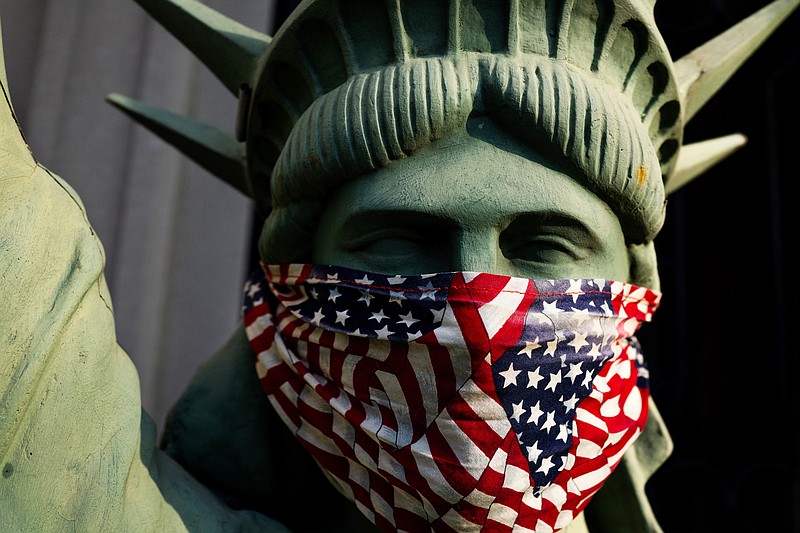If you're not in a celebratory mood for this Fourth of July weekend, you're not alone.
As a matter of fact, 83 percent of Americans responding to a new Pew Research Center survey recently said they did not feel proud of the state of the country right now. And with COVID-19 spiking - particularly in the South - health officials have urged us to stay home or at the very least social distance and wear a mask.
Well, call it your freedom mask, and know that as we contemplate our freedoms, we have unfinished business.
"We hold these truths to be self-evident, that all men are created equal, that they are endowed by their Creator with certain unalienable Rights, that among these are Life, Liberty and the pursuit of Happiness."
That wonderful and probably best-known sentence of the Declaration of Independence, ratified on July 4, 1776, has been a great foundation for this strong and ever-changing nation.
Much of our nation's change - both in the country and in our Constitution - has come just in the past 100 years. And it has come, and still comes, in fits and starts - and sometimes backward steps.
* In 1920, the ratification of the 19th Amendment gave women the right to vote. Equal pay laws, equal credit laws and other gender equality measures followed, but women are still waiting for the reality of equal pay. One hundred years later, the nation's average pay disparity is still striking: Women make 81 cents for every $1 earned by men. (In Tennessee, that's 80 cents, while in Georgia and Alabama, it's 77 cents and 73 cents, respectively.)
* Women aren't the only ones waiting. Lyndon Johnson signed the Civil Rights Act of 1964 into law just two days before the country's 188th July 4th holiday. A year later, he and his congressional allies passed the Voting Rights Act of 1965. All of that was to finally bring about the equality intended by the Emancipation Proclamation of 1862 which changed the legal status under federal law of more than 3.5 million enslaved African Americans. But equity is still very much debated for Black Americans.
In 2013, the Supreme Court gutted the Voting Rights Act, and many Republican-controlled states followed by systematically passing laws aimed at making women and Blacks jump through ridiculous hoops to vote.
This year, with a pandemic raging and the November election just four months away, Tennessee remains a holdout for automatically providing mail-in voting, though Davidson County Chancellor Ellen Hobbs Lyle ruled that voters under 60 can request an absentee ballot. Lyle's ruling has been appealed by the state of Tennessee, but the Supreme Court said earlier this month it won't consider the appeal in time for the August primary election. Democracy in action is a slow process. Sometimes too slow.
* Today we have a president who, though he won the election with the Electoral College, still dubiously claims he lost the popular vote because 3 million fraudulent votes were cast for his opponent. He had and has no proof of this, of course. State and national election officials dispute it. Nonetheless, he continues to oppose mail-in voting during the pandemic, making the same false claims of possible fraud.
And never mind Russian hacking and interference in our 2016 election. Or Trump's entreaties last year to Ukraine and China to help him win again in 2020. Trump still says Russia (and now Ukraine and China) revelations were a hoax, but the Supreme Court said Thursday it will decide later this year whether Congress may see parts of the report prepared by Robert S. Mueller III, the special counsel who investigated Russian interference in the 2016 election. Again, democracy moves slowly.
* In 2015, the Supreme Court ruled that health care access is a right, but in June, even as the pandemic ticks up, the Trump administration asked the Supreme Court to overturn the Affordable Care Act, telling the court that "the entire ACA must fall." That comes just as hundreds of thousands of Americans have turned to the government program for health care as they've lost jobs during the coronavirus pandemic. Time will tell.
* Also in 2015, the Supreme Court ruled that gays have the same right to marry as all other Americans. And last month, the high court decided by a 6-3 vote that a key provision of the Civil Rights Act of 1964 known as Title VII that bars job discrimination because of sex, among other reasons, encompasses bias against people because of their sexual orientation or gender identity.
"An employer who fires an individual for being homosexual or transgender fires that person for traits or actions it would not have questioned in members of a different sex," Trump-appointed justice Neil Gorsuch wrote for the court. "Sex plays a necessary and undisguisable role in the decision, exactly what Title VII forbids." Democracy in action climbs a ladder sometimes one rung at a time.
* Immigration, too, is still a flash point in this country of immigrants. Trump stirred even Republican ire when he recently suspended immigration for H-1B visa permits and vowed to pursue ways to end the Deferred Action for Childhood Arrivals program, which the Supreme Court said last month he had improperly ended in 2017.
Democracy is messy. Our founders understood that and even planned for it, expecting us to keep working on this wonderful and free country we call America.
We can do it. We will do it. We always have.
Happy birthday, America.
